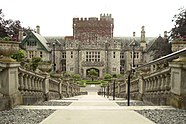User:Ebrary2/Sandbox1: Difference between revisions
| (One intermediate revision by the same user not shown) | |||
| Line 102: | Line 102: | ||
Due to the pagan connotations of the name, a committee was established in 1986 by the government of president Jacobo Castello to possibly rename the city. Top proposals were Ebraropolis and Sancte Maria. However, the effort was eventually abandoned due to the continued popularity of the city's traditional name. | Due to the pagan connotations of the name, a committee was established in 1986 by the government of president Jacobo Castello to possibly rename the city. Top proposals were Ebraropolis and Sancte Maria. However, the effort was eventually abandoned due to the continued popularity of the city's traditional name. | ||
==History== | |||
Ceres was officially founded in 413 by Marcus Ebraius on the site of the already-existing Ebraro-Geltic village of Kenfar. Little is known about the Ebraro-Geltic settlement of the area, excepting that the site was a minor center of trade and agriculture. Ebraius established Ceres with a system of government modelled on the [[wikipedia:Republic#Classical_republics|classical republics]], governed by a Senate and led by a single Consul. He himself became the first Consul of Ceres in this era. While other cities were founded by Aroman settlers after, Ceres remained the most-populous and preeminent city in Ebrary. | |||
==Administration== | ==Administration== | ||
Latest revision as of 16:50, 1 February 2022
This article is incomplete because it is pending further input from participants, or it is a work-in-progress by one author. Please comment on this article's talk page to share your input, comments and questions. Note: To contribute to this article, you may need to seek help from the author(s) of this page. |
Autonomous City of Ceres | |
|---|---|
Capital city and autonomous city | |
From top, left to right: Palatio Presidential; Cathedral de Ceres; Palatio de Estalta; Ebrarian Museum; Historic Center (Old Town); Statue of Marcus Ebraius; Castello Providence | |
| Country | Ebrary |
| Founded | 413 |
| Founded by | Marcus Ebraius |
| Government | |
| • Type | Autonomous city |
| • Body | City Council |
| • Mayor | Abrero Baran (PRC) |
| Population | |
| • Total | 2,530,000 |
| • Rank | 1st in Ebrary |
| Demonym | Ceresian |
Ceres, officially the Autonomous City of Ceres, is the capital and largest city of Ebrary, in addition to its cultural and economic center. The city is located in the middle of the Ceres Delta region and in the south-central portion of Ebrary. The city is an enclave, surrounded in all sides by Laverna Province.
The city of Ceres is not the capital of Laverna Province, nor is it the Province's capital. Ceres is governed as an autonomous city, equal in status to, and independent of, the provinces of Ebrary. During the previous Republic of Ebrary and Kingdom of Ebrary, Ceres had been governed as part of a capital district. After the Ebrarian Revolution, Ceres was incorporated into Laverna Province until the city was removed from the Province with a 25 June 1989 amendment to the current Ebrarian Constitution. Ceres was, per the constitutional amendment, created as its own independent first-level administrative unit. The Autonomous Cities Act of 1990 further defined the powers and responsibilities of the governments of Ebrary's autonomous cities. Per the aforementioned law, Ceres is governed by an elected mayor and elected city council, which functions similarly to other municipal governments but also retains most of the powers devolved to Ebrary's nine standard provinces.
The Greater Ceres metropolitan area, which also includes the city of Urtedo and other municipalities in Laverna province, makes up the most populous metropolitan area in the Ebrary.
Ceres has many officially recognized National Landmarks, including: Castello Providence, Palatio de Estalta, Palatio Presidential, Castello Corporation, Casa National, Cathedral de Ceres, and Church of the Pentecost.
Etymology
Curiously for a city founded by early Christians, Ceres was named for the Aroman goddess Ceres. It is believed that when Marcus Ebraius founded the city, he named it Ceres due to its central location in the prolific agricultural region of the Ceres Delta. As well, being a goddess of fertility, the name Ceres symbolized the birth of a new land to be settled by Aroman colonists.
Due to the pagan connotations of the name, a committee was established in 1986 by the government of president Jacobo Castello to possibly rename the city. Top proposals were Ebraropolis and Sancte Maria. However, the effort was eventually abandoned due to the continued popularity of the city's traditional name.
History
Ceres was officially founded in 413 by Marcus Ebraius on the site of the already-existing Ebraro-Geltic village of Kenfar. Little is known about the Ebraro-Geltic settlement of the area, excepting that the site was a minor center of trade and agriculture. Ebraius established Ceres with a system of government modelled on the classical republics, governed by a Senate and led by a single Consul. He himself became the first Consul of Ceres in this era. While other cities were founded by Aroman settlers after, Ceres remained the most-populous and preeminent city in Ebrary.
Administration
City government
Ceres is governed by an executive called the Mayor and a city legislature called the City Council. The City Council comprises 25 seats representing districts throughout Ceres apportioned by population. Council members serve 2-year terms, with 13 of the seats coming up for reelection in even-numbered years, and 12 of the seats in odd-numbered years. The council is chaired by the Council Chairman. Center Reformists currently have a majority of 14-to-11.
Due to the nature of the autonomous city form of government, the city government in Ceres takes on most of the powers and reponsibilities of an Ebrarian province as well as a more localized government. The city government is responsible for local correctional institutions and policing, recreational facilities, local parks, sanitation, water supply, transport, and food banks. The City Council also sets, and the city government collects, taxes for the funding of such activities. These taxes include a property tax, land tax, income tax, and business tax, as well as more indirect taxes such as amenities, tourist, and transport taxes. The national government also grants Ceres a portion of national taxes collected in the city.
National government
Ceres is the capital city of Ebrary. Many government ministries, as well as the respective residences of the president and the Sovereign Protector, are located in the city. In regards to Parliamentary representation, Ceres elects 8 constituency seats in the Popular Assembly, and 16 members of the Senate are residents of Ceres. Because Ebrary uses mixed-member proportional representation to apportion seats in the Popular Assembly, Ceres voters also place a vote for a political party which apportions seats from party lists to make the composition of the lower house proportional. Currently, 9 members of these "list seats" are held by residents of Ceres.






